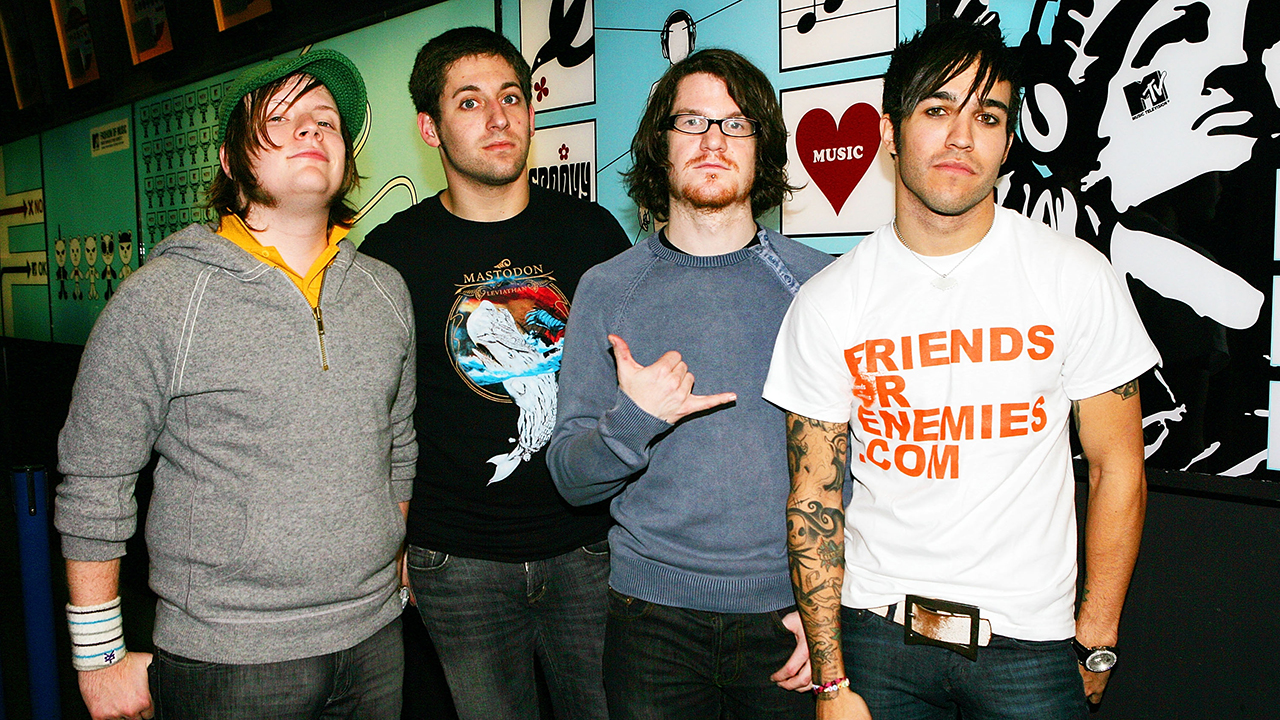All bands and artists are subject to debate over their best album or era, but there are few fanbases as divided as Fall Out Boy’s.
Many see their career as being split into two parts: pre and post-hiatus. The pre-hiatus albums – Take This To Your Grave, From Under The Cork Tree, Infinity On High and Folie à Deux – are usually the favourites of fans in their 20s and 30s, who were teenagers around the mid-00s.
Post-hiatus, Save Rock And Roll, American Beauty/American Psycho and MANIA saw Fall Out Boy appealing to not only a new, young audience, but a much wider one. That mass appeal soon rubbed day one fans the wrong way.
That perceived dichotomy splits fans down the middle, and nitpicking over which record within those eras is “best” divides them further. It’s something the band see – when I interviewed Pete Wentz in November, he acknowledged that a lot of people got into Fall Out Boy as teenagers – before shunning them along with all the other things they loved as adolescents.
“I’ve noticed that a lot, people come back to it. It’s an interesting thing to be a part of,” he told me.
It’s a reality I recognise. My favourite Fall Out Boy record, From Under The Cork Tree, turns 15 this week. Whether you’re in your 30s or your teens, chances are you got into the band in your adolescence. The album you consider the best is likely to just be the one that found you first.
Over 15 years, I’ve listened to From Under The Cork Tree thousands of times, and it has become my all-time favourite album. I came to it as most teenagers did, by watching the video for Sugar, We’re Goin’ Down on TV before becoming utterly besotted with everything about Fall Out Boy. It was my first introduction to an unshakable obsession, and while I quickly worked backwards, buying Take This To Your Grave and An Evening Out With Your Girlfriend, nothing sparked the same curiosity that Cork Tree did.
Maybe if I was born slightly earlier or later, I would have a different answer. But as for many, my favourite Fall Out Boy album is a matter of timing.
"Nothing makes me feel more at home than knowing every beat of that album by heart"
I spent most of 2005 listening to Cork Tree on repeat while reading the lyric booklet with intense focus. In May 2006, my attention span was broken by one event: I left my copy of From Under The Cork Tree at Christie Gaskin’s house during her 13th birthday party. I was gutted.
The fact that I’d deemed it appropriate to bring it over in the first place says a lot about my mindset. A few hours with friends, indulging in party games and eating whipped cream from the can, were not complete without doing what I’d be doing at home: listening, once again, to Cork Tree. My mom called her mom, who said she hadn’t seen it, and so I was left with nothing but a rip of the CD on my hard drive.
It wasn’t the same, and I was bereft. Losing Cork Tree disrupted my equilibrium. It broke my focus. I couldn’t afford to buy another, but I kept the obsession up for the most part, going to my first Fall Out Boy show later that month. When Infinity On High came out in 2007, I had been kicked out of my house and was living between my ex-stepdad’s and a friend's. I wasn’t allowed to go out and buy the album I’d been waiting for for two years, so a friend burned it for me.
I never got into it – maybe as a result of the detached experience of not being able to read the lyrics. Maybe that’s why I’ve not really got into any other record quite as much since, either.
Now, my story and Fall Out Boy’s is a little more intertwined than that 13-year-old might ever have hoped. But it might not have been.
I stopped listening to Fall Out Boy until 2013, when I went to an alternative club with university friends. I had forgotten the grip that Cork Tree had on me, and I associated that time with the loneliness and chaos that defined my childhood. Tipsy on the “emo floor”, I heard Sugar... for the first time in years. I was ready to go elsewhere, but my friend Emma, who would die two months later from Cystic Fibrosis, was out with us that night. She was effervescent, sociable in a way I longed to be. She knew the song, of course, but I insisted, “you can’t dance to this”. She promised to prove me wrong, teaching me silly moves while I realised I still knew all the words. Shortly after, I listened to it in full, and I never looked back. I credit Emma with reuniting us.
My obsession got a second life with me that night. After so many years apart, suddenly all I wanted to hear was Fall Out Boy: in clubs, in the car, at home. I wanted to make up for the lost time I’d spent denying myself something that I loved because I had “grown up”. Maybe falling out of love with Fall Out Boy wouldn’t have happened if I hadn’t left my much-worn copy of Cork Tree on top of Christie’s microwave in 2006, or gotten kicked out in 2007. But falling back in love has brought me so much, and that album is a part of who I am. Seeing someone so positive dance so freely to music that I’d associated with sadness and introspection told me, explicitly or otherwise, that fuck it: I could love it too, in a new way that didn’t have to take past misery into account.
Our choice of “best” album is rarely a matter of reason, but one of timing, of feeling, of who we are. Humans are emotional creatures, and my love of Cork Tree has indelibly affected my career, my identity, and how other people understand me. I associate it with my adolescence, my grief, my favourite memories.
Learning to be candid about my obsession has been a sometimes painfully revealing process. But it’s reassuring, too, to remember: this is who I am. I like things, sometimes too much, and maybe that’s fine. Nothing makes me feel more at home than knowing every beat of that album by heart, from camera shutters to the closing of XO.
Maybe I wish I could hear it for the first time. Maybe, instead, I am grateful that I’ve had it for so long that it’s burrowed its way into the very fibre of who I’ve become, what I do, and how much capacity I have to love and appreciate something so completely, even 15 years on.

